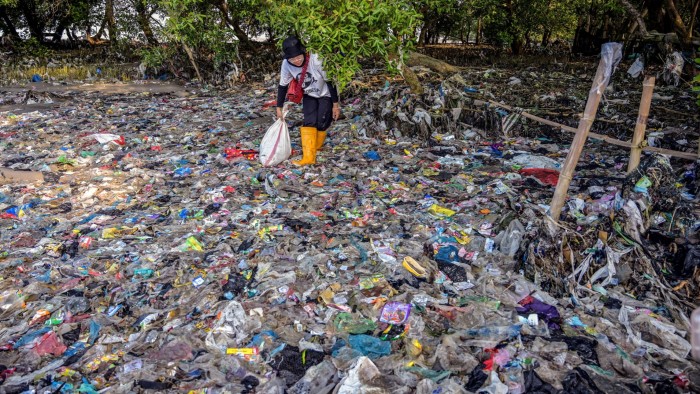Unlock the Editor’s Digest for free
Roula Khalaf, Editor of the FT, selects her favourite stories in this weekly newsletter.
Plastic pollution is a “grave, growing and under-recognised danger to human health”, an international team of scientists and doctors warned ahead of a UN conference this week to negotiate a global plastics treaty.
The group of 27 health experts reported in The Lancet on Sunday that the materials were causing extensive disease “at every stage of the plastics life cycle and at every stage of human life”. Infants and young children were particularly vulnerable, they said.
“The impact of plastics on human health has been a sleeper issue compared to climate change and air pollution, but evidence is now emerging to show how serious it is,” said the report’s lead author, Philip Landrigan, director of the Global Observatory on Planetary Health at Boston College.
Delegates from 170 countries will meet in Switzerland from Monday for another shot at agreeing a treaty after the fifth round of talks collapsed in South Korea last December.
The Korea negotiations, which were supposed to conclude the treaty, fell apart when fossil fuel-producing nations blocked attempts by 100 countries to limit virgin plastic production.
Landrigan called on the diplomats in Geneva to create “meaningful and effective international co-operation in response to this global crisis”.
Human health is expected to play a large role in the upcoming talks. In Korea, 94 countries agreed on an obligation to phase out elements damaging to humans.
Experts have identified a wide range of impacts, including cardiovascular disorders, cancer, diabetes and respiratory illnesses, as well as increased vulnerability to infections. No reliable estimate has been calculated for the overall disease burden, Landrigan said.
But the health problems caused by just three chemicals widely used in plastics cost a total of $1.5tn in one year across 38 countries covering one-third of the world’s population, according to a study from last year cited in the report.
One chemical, BPA (bisphenol A), was associated with 237,000 deaths from ischemic heart disease and 194,000 stroke deaths worldwide, according to the study, led by Maureen Cropper of the University of Maryland.
The report coincides with the launch of an independent global monitor, the Lancet Countdown on Health and Plastics, to track plastic pollution’s impact.
Landrigan said the group did not want to phase out plastics altogether. “There are many applications in modern society for which they are essential, but we need to distinguish these from frivolous ones such as single-use plastics, which account for 40 per cent of plastic production,” he said.
With the Trump administration generally opposed to global environmental agreements, Landrigan was cautious about the Geneva talks but said “we still have an obligation to press ahead”.
Few have hope that they can win over Russia, Iran and Saudi Arabia — or even moderate countries such as Brazil — on a virgin plastic production cap. But a phaseout of harmful products and chemicals has more widespread support, including from Brazil, which has been active in moving negotiations forward.



